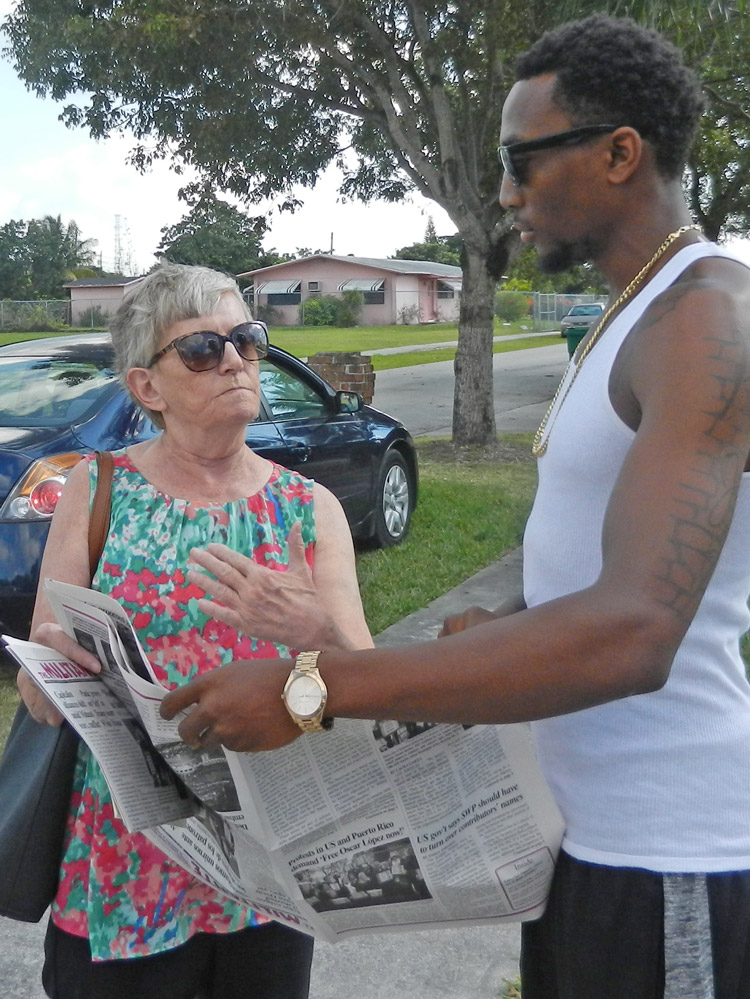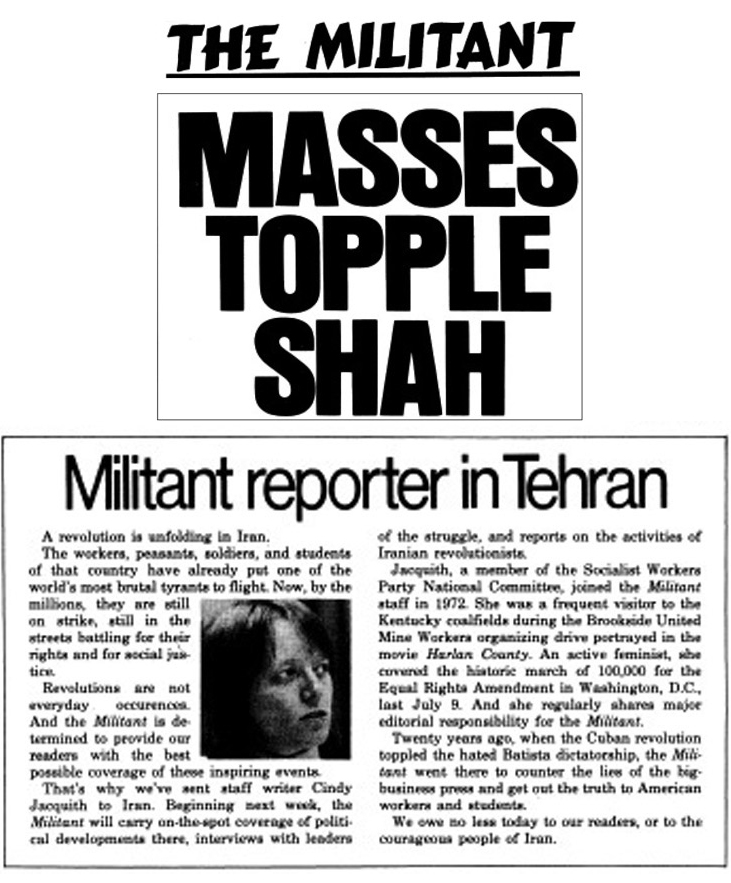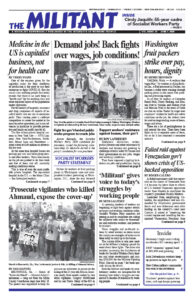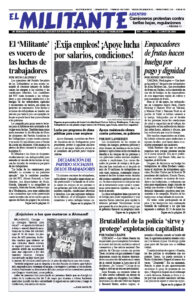
MIAMI — Members and supporters of the Socialist Workers Party gathered here May 10 to celebrate the life of Cindy Jaquith, a cadre of the SWP for 55 years. Jaquith died May 1 at 72. Participants in the celebration came from around Florida, Atlanta, New York, Pittsburgh and Louisville, Kentucky.
A five-panel display of photographs and articles highlighting the SWP’s work over the past half-century, and Jaquith’s many leadership contributions in helping advance the party, helped those in attendance see what a rich, politically productive life she lived.
More than 40 messages were sent to the meeting from comrades and friends who knew and worked with her. These included messages from Jonathan Silberman on behalf of the Political Committee of the Communist League in the U.K., and others from CL leaderships in Australia, New Zealand and Canada. One came from her sister Diane, describing Cindy’s early life.
“Cindy was the second of four children raised in Lexington, Massachusetts, an affluent suburb of Boston,” Diane Jaquith wrote. “Cindy excelled at school, and devoted much time to Girl Scouts, even attending the national roundup. She enjoyed teaching her younger sister how to cook and sew, and assisted with her sister’s Brownie troop. The only trouble she ever got into was when, in high school, Cindy and her friends managed to steal American flags from every classroom and hid them.”
Reaching to workers’ struggles
“Some of Cindy’s first writing assignments for the Militant were covering the coal miners’ battles in Harlan County, Kentucky, in the early 1970s,” Jacquie Henderson told the audience. Henderson worked with Jaquith when both were members of the Houston branch.
“Those early trips to the coalfields contributed to the SWP setting up a branch in Morgantown, West Virginia, and building a fraction of party members in the United Mine Workers union.”
“Cindy became a worker-Bolshevik in the U.S. class struggle,” said Paul Mailhot, speaking to the meeting on behalf of the SWP Political Committee. “From her involvement in the fight against the Vietnam War, the struggle for Black rights, building the movement for women’s liberation, to the struggles in the coalfields and participation in many of the party’s trade union fractions, these were the experiences that made Cindy a proletarian fighter of some standing. And made her so capable of helping to work with others, and report for the Militant on developments in the working-class movement internationally.
“When Cindy carried out an assignment to write about class-struggle developments,” said Mailhot, “she was always a help to those she was working with, not just about being a better worker-correspondent but about being a better proletarian fighter.”
That came across in the messages. “Cindy came out to Price, Utah, to cover the first Western Women Coal Miners Conference in 1985,” wrote Cecelia Moriarity, a member of the party in Seattle. “She taught Charlene Adamson and me how to write for the Militant ourselves; how to include what we thought were the important and exciting facts about this well-attended gathering. It was a lesson that we remember to this day.”
1979 Iranian Revolution
In early 1979 a massive revolutionary mobilization of working people and youth overthrew the hated regime of the shah of Iran and opened the road for millions to engage in politics. The Militant sent Jaquith to report from the scene — in January and February, and again at the end of that year and into 1980.

Ma’mud Shirvani described this work in a message to the meeting. “The weekly coverage Cindy provided as a worker-correspondent for the Militant — talking with workers, soldiers, Kurdish fighters, women demanding their rights, and others — is unparalleled by anything else written on the Iranian Revolution. She reported with a Bolshevik sense of the present as history.”
The potential of the revolution in Iran was cut short by a bloody clerical-bourgeois counterrevolution. Working people there, however, have fought and kept space open for discussion of political ideas. Since 1992 Pathfinder Press has presented books by revolutionary working-class leaders at the annual Tehran International Book Fair.
Beginning in 1999 Jaquith went to Iran almost yearly for a decade to staff Pathfinder’s booth, until visa restrictions made it no longer possible. Pathfinder’s distributor in the United Kingdom has kept up the effort to this day.
Mailhot highlighted a message by Tony Hunt, from Pathfinder London who worked with Jaquith at the Tehran event. “Cindy could be stern, often demanding,” he said. But that was “accompanied by a dead-pan delightful sense of humor.
“I remember her ability to pedagogically explain a political issue or describe the contents of a particular book for visitors at the fair in a way that brought it to life, like she was telling a story,” Hunt wrote. “I learned a lot from Cindy: the firm leadership she displayed when it was needed and her discipline.”
Jaquith’s working-class journalism was a by-product of her primary commitment — being a proletarian revolutionist. In that regard, Mailhot said, the political example she set as an SWP leader for revolutionary-minded workers in Iran was invaluable. “That was the party whose record they looked to for program and proletarian conduct,” Mailhot said, “because the SWP leadership had been tested in the course of the class struggle and its response to popular revolutions worldwide.”
The Managua bureau
From late 1985 to 1987 Jaquith was the organizer of the Militant reporting team stationed in Nicaragua covering the struggle of workers and farmers to defend their revolution.
“Within weeks of the 1979 overthrow of Somoza the party set up what became the Managua bureau to learn from the revolution and to tell the truth about what workers and farmers were accomplishing,” Seth Galinsky, who worked with Jaquith there, wrote in his message.
“By late 1986, the revolution had begun to stagnate, even as some advances continued to be made,” he wrote. “Working people dealt decisive blows to the U.S.-backed contras.
“Instead of using that victory to advance the revolution by deepening the participation of working people and youth, the FSLN leadership did the opposite,” he said, “announcing that no more of land would be taken from the ‘patriotic producers’ to be given to the tens of thousands of landless peasants.” The demise of the revolution followed a few years later.
Jaquith returned to Nicaragua in 1990 to organize some final reporting until the bureau was closed later that year.
Fight for women’s emancipation
A number of displays and messages highlighted Jaquith’s involvement in the struggle for women’s emancipation.
“I first met Cindy in New York in the late ’60s, after she transferred from Carleton College to Barnard,” Susan LaMont, organizer of the Atlanta branch of the SWP, told the meeting. “This was a period of radicalization that deeply affected working people and youth — above all, the struggle that smashed Jim Crow segregation in the South and strengthened the fight for Black equality in the North, the triumph of the Cuban Revolution in 1959, and the growing movement against Washington’s war in Vietnam. The women’s liberation movement came onto the stage at this time.
“The SWP recognized this would affect the course of the American Revolution, and the building and development of leadership of our own party,” LaMont said. “Cindy helped to lead the growing participation of the SWP in the battles for women’s rights. She was fearless in the debates that raged, helping set an example in taking on red-baiting attacks by those forces determined to take the struggle into the dead end of supporting capitalist politicians.”
Jaquith took on many leadership responsibilities. She was elected national secretary of the Young Socialist Alliance at its 1970 national convention. She was a member of the SWP National Committee from 1976 through 1991, and attended the party leadership school in 1980. She joined the Militant staff in 1972 and wrote for the paper almost continuously through 1991, serving as the paper’s editor for a number of those years. The Militant index includes more than 1,000 articles she wrote. Jaquith, no matter what her responsibilities, was an example of a lifelong worker-correspondent for the revolutionary press.
Anthony Dutrow, organizer of the SWP branch in Miami, spoke about Jaquith’s activity to build the party over the last five years here. “Cindy always overcame whatever obstacles were in her way in order to keep building the SWP. She was just getting started in the party’s fraction at Walmart last year when she was diagnosed with cancer. She beat it, and was welcomed back by her co-workers.
“Cindy could give a Militant Labor Forum talk that conveyed the party’s program for socialist revolution in a way that everyone could grasp,” Dutrow said. “She was able to do that because she understood the program, and deeply believed in it.”
Describing the times Jaquith practiced politics in, Mailhot pointed to remarks by Farrell Dobbs, a leader of the SWP and Teamster battles in the 1930s. “Some people,” Dobbs said, “have the good fortune to live more in a year than others at a different historical juncture could live in their whole lifetime.”
“And Cindy understood the necessity of building the revolutionary party and preparing for those battles that are coming,” Mailhot said. “She set a good example for all of us, and for the next generations of fighters who will continue along the course she set out on some 55 years ago.”
A collection of $1,250 was raised at the meeting to honor and continue Cindy Jaquith’s lifelong work to build the Socialist Workers Party.

